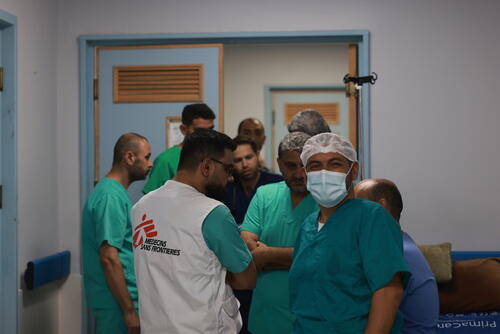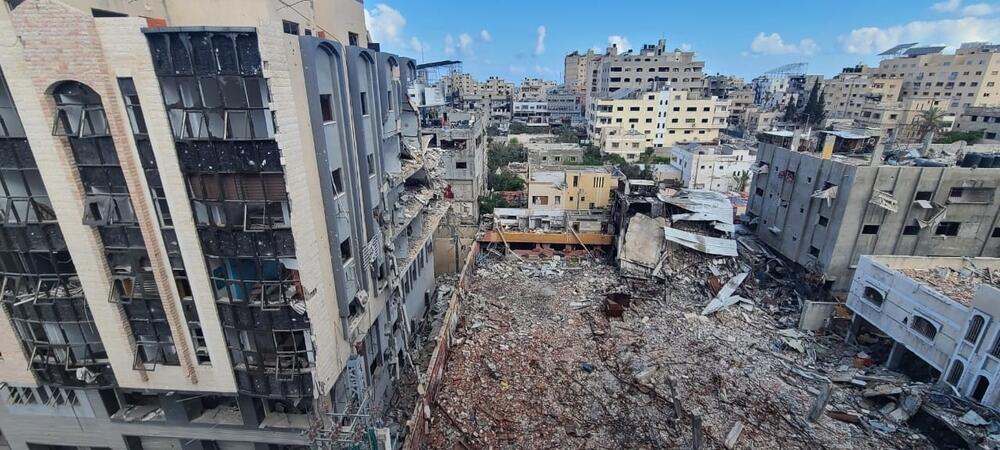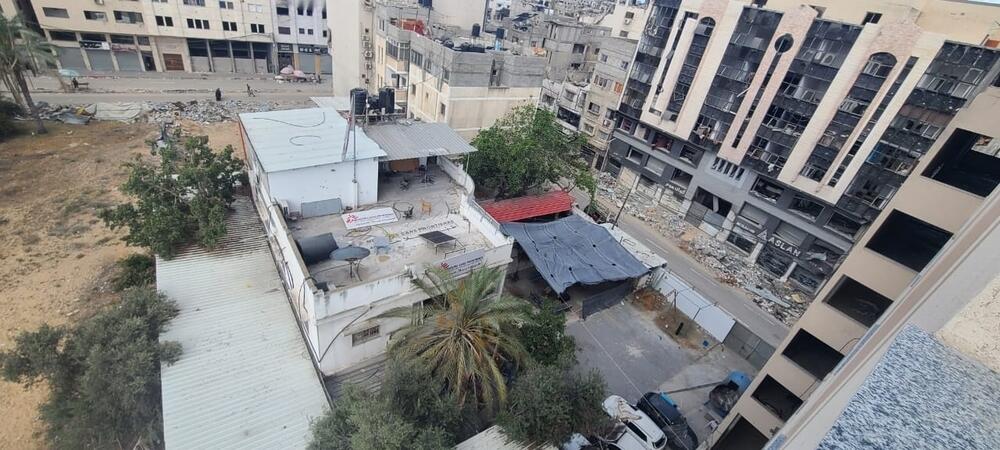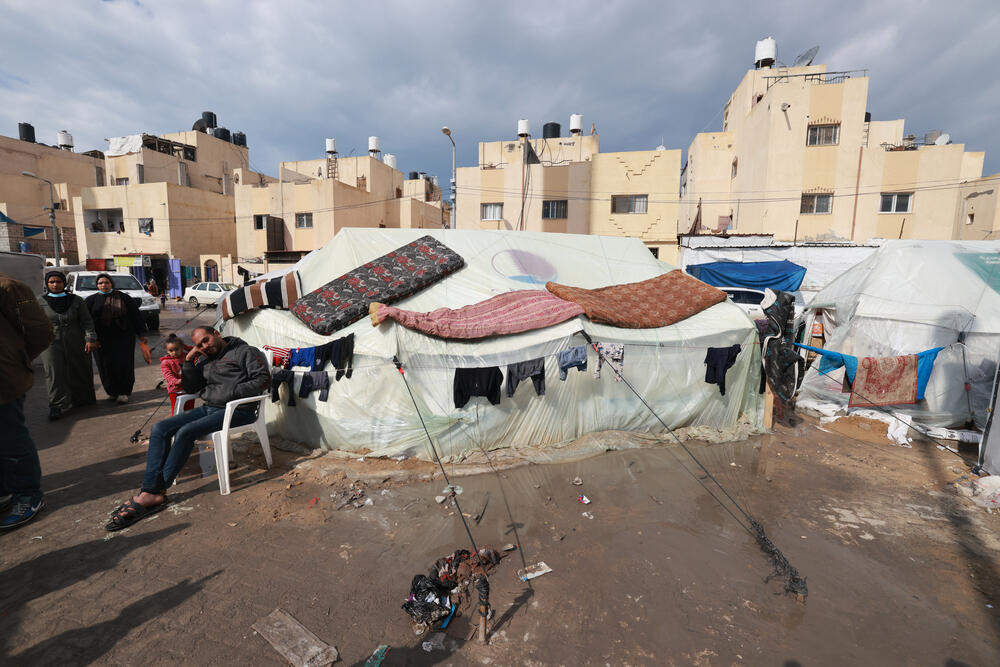Israeli forces pushing people from north to south Gaza will worsen humanitarian crisis
21 October 2024
Israeli evacuation orders for parts of northern Gaza, issued on 7 October, are pushing tens of thousands of people to immediately flee south as the area is targeted by airstrikes and a ground offensive. In this latest forced mass displacement, residents of Beit Hanoun, Jabalia and Beit Lahia have been urged to move to the overcrowded, so-called humanitarian zone between Al-Mawasi and Deir Al-Balah, where one million people are already living in inhumane conditions. The zone also remains unsafe for civilians and aid workers, as Israeli forces continue to repeatedly strike the area.
These forced mass evacuations of homes and bombing of neighbourhoods by the Israeli forces are turning the north of Gaza into an unlivable wasteland, effectively emptying out the whole north of the Strip of Palestinian life. To make matters worse, no humanitarian supplies have been allowed to enter the area since 1 October.
MSF calls on the Israeli forces to halt evacuation orders, which are causing the forced displacement of people, and to ensure the protection of civilians. They must also allow desperately needed humanitarian supplies to enter the north as a matter of extreme urgency.
Donate to the Gaza Emergency Regional Fund
Help provide vital medical care to those who need it most.

“All of a sudden, I was told that we had to move from the north,” says Mahmoud, a Médecins Sans Frontières (MSF) watchman, who left Jabalia at night to find refuge at the MSF guest house in Gaza City. “We left our home in despair, under bombs, missiles and artillery. It was very, very difficult. I would prefer to die than to be displaced to the south; my home is here, and I do not want to leave.”
Israeli forces also called for the evacuation of the three main hospitals in northern Gaza, namely Indonesian, Kamal Adwan and Al-Awda hospitals. These are operating at minimal capacity and have a total of 317 patients still hospitalised, with around 80 people in intensive care and unable to move, according to the Ministry of Health. These three medical facilities, as well as those that remain partially functional across the Strip, must be protected at all costs.
The MSF clinic in Gaza City received 255 patients on Sunday and Monday alone, as options for people to access medical care shrink by the day. For some people, accessing the few existing health facilities is impossible; our teams have received reports of wounded people who have died as they were unable to seek medical care.
Among those facing evacuation orders in the north are seven MSF staff who managed to find shelter in Gaza City. Five others remain blocked in Jabalia, where the Israeli forces are on the ground carrying out attacks.
“The latest move to forcefully and violently push thousands of people from northern Gaza to the south is turning the north into a lifeless desert, while aggravating the situation in the south, where more than one million people have already been squeezed into a small portion of the Gaza Strip and live in deplorable conditions,” says Sarah Vuylsteke, MSF project coordinator in Gaza.
“Access to water, healthcare, and safety is already almost non-existent, and the thought of more people fitting into this space is impossible to imagine,” says Vuylsteke.
“People have been subjected to endless displacement and relentless bombing for the past 12 months. Enough is enough, this must stop now.”
While the Israeli authorities have recently declared a minimal expansion of the so-called humanitarian zone, the area remains subject to evacuation orders and is unsafe due to regular Israeli bombardment. Many people living in the zone are suffering from skin diseases and respiratory infections because of the dire conditions. The situation is even more worrying with the approach of winter and the cold temperatures that people will be exposed to.
Israeli forces must urgently halt evacuation orders in the north of Gaza. The relentless killing of people in Gaza must stop now, and an immediate and sustained ceasefire must be implemented.
Update from 19th October 2024
“While the northern part of the Strip is under siege since over two weeks, it is absolutely crucial to ensure the protection of the few remaining functional healthcare facilities. People must continue to access medical care and lifesaving treatments. We call on the Israeli forces to immediately stop their attacks on hospitals in North Gaza,” says Anna Halford, MSF emergency coordinator in Gaza.
According to the Ministry of Health and health workers on the ground, Israeli forces are currently besieging and targeting the Indonesian, Al-Awda and Kamal Adwan hospitals. More than 350 patients are reported to be trapped inside, including pregnant women and people who just underwent surgical operations. These patients require continuous medical treatment and are unable to leave.
“The ever-worsening escalation of violence and non-stop Israeli military operations that we have been witnessing over the past two weeks in northern Gaza have horrifying consequences,” says Halford.
Tens of thousands of people remain trapped in Jabalia camp under daily bombing, including six of our staff unreachable due to electricity blackout, while one of our colleagues was killed after sustaining injuries from shrapnel. “When hospitals are attacked, their infrastructure destroyed, and the electricity cut off, the lives of patients and medical staff are under threat.”
Hundreds of people in need of vital care must urgently be evacuated as their lives are in danger. Essential items, including food, are only entering in quantities that are largely insufficient for the population in the north of the Strip.
“This is purely and simply a collective punishment imposed on Palestinians in Gaza, who must choose between being forcibly displaced from the North or killed. We fear that this will not stop,” says Halford.
“Israel’s all-out war on Gaza seems to have no end in sight. Israel’s allies bear a heavy responsibility for this dire situation, caused by their unwavering support for the war. They must immediately do everything in their power to obtain a sustained ceasefire. Not tomorrow, not in a week. Now,” says Halford.


